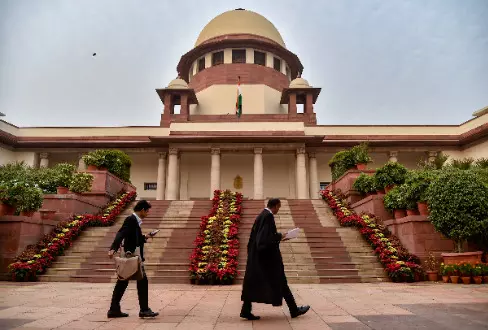Plea that SIR of electoral rolls wasn't held earlier not ground to challenge: SC

New Delhi: The Supreme Court on Wednesday said the argument that the special intensive revision of electoral rolls was never conducted before in the country cannot be used to examine the validity of the Election Commission's decisions to carry out this exercise in several states.
Commencing final hearing on a clutch of petitions challenging the validity of the EC's decisions to carry out the revision of electoral rolls in several states, a bench comprising Chief Justice Surya Kant and Justice Joymalya Bagchi said the poll panel has "inherent power to determine correctness of entry in Form 6".
Form 6 has to be filled up by a person to register himself or herself as a voter.
The bench also reiterated that the Aadhaar card does not "confer absolute proof of citizenship and that is why we said it will be one of the documents among the list of documents... If any one is deleted they will have to be given a notice of deletion".
"Aadhaar is a creation of statute for availing benefits. Just because a person was granted Aadhaar for ration, should he be made a voter also? Suppose someone belongs to a neighbouring country and works as a labourer," the CJI said.
The bench did not seem in agreement with a particular submission and said, "You are saying the Election Commission is a post office which must accept the Form 6 submitted and include your name."
"Prima facie, yes ... unless there is some contrary material," senior advocate Kapil Sibal, appearing for some of the petitioners, said.
"The Election Commission will always have this inherent constitutional jurisdiction to determine correctness of the documents...," the bench said.
The top court, meanwhile, also fixed the schedule of hearing on several pleas specifically challenging SIR in Tamil Nadu, Kerala and West Bengal.
The bench asked the poll panel to file its response to pleas challenging SIR in Tamil Nadu by December 1 and it gave two days time to the petitioners to file their rejoinders. The petitions will be listed on December 4.
On pleas against SIR in Kerala, the poll panel will have to file its reply by December 1 and the petitions will be heard on December 2.
The bench said the pleas against SIR in West Bengal, where few BLOs have allegedly committed suicide, will be taken up for hearing on December 9 and in meanwhile the Election Commission has to file its reply over the weekend.
The bench said the West Bengal State Election Commission and the state government are also at liberty to file its reply by December 1.
The CJI-led bench commenced the final hearing on a larger issue on legality and validity of the EC's decision to undertake the revision of electoral rolls.
Sibal initiated arguments by asserting that the SIR exercise raised fundamental concerns about democratic participation.
"This is a matter which affects democracy," he said.
He said the SIR places an unconstitutional burden on ordinary voters, many of whom are illiterate, to fill the forms and risk exclusion if they fail to do so.
"Filling up the forms is not the responsibility of the elector. So many are illiterate and do not know how to read and write. If they cannot fill forms, they will be ousted (from electoral rolls)," he said, urging the court to focus on constitutional safeguards rather than procedural justifications.
He said once a voter's name is included in the electoral roll, the presumption of validity follows unless the state proves otherwise.
"Any exclusion must follow a process which is reasonable and fair," he said.
A self-declaration under Form 6, he emphasised, is accepted as proof of citizenship for inclusion and cannot be subjected to an unreasonable standard for retention.
Sibal said that Aadhaar establishes residence, and while not conclusive of citizenship, it triggers a presumption that cannot be brushed aside.
"There is a presumption in my favour. I have an Aadhaar. That is my residence. You want to take it away... take it away by a process and let the process be proven before this court," he said.
He warned that the SIR cannot be completed meaningfully in the short timelines prescribed.
"The process of getting this data cannot be completed in two months," he said, questioning its feasibility in remote regions.
"See the reality of my country... Do you think in far-removed areas of West Bengal or Bihar people know how to fill enumeration forms," he asked.
Justice Bagchi observed that Form 6, used for inclusion, cannot bind the Election Commission to accept entries without verification.
Justice Bagchi emphasised the need to weed out deceased voters, noting that lists were publicly displayed in panchayats and on official websites.
"We do not judge in a vacuum," he said.
Advocate Prashant Bhushan drew attention to Assam's SIR guidelines, arguing that they improperly empower electoral officers to determine citizenship.
The CJI responded that Assam is a unique case with foreigners tribunals established under special statutes, and that such determinations were limited to "D-voters" those marked as doubtful.
Sibal said that issues such as citizenship and unsoundness of mind must be decided by competent statutory authorities that are the union ministry of home affairs and not booth level officers (BLOs).
"BLOs have no right to get into this," he said, terming the entire SIR exercise "erroneous and unconstitutional".
The hearing will continue on Thursday.



